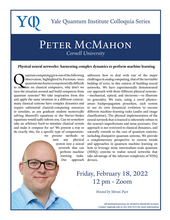Physical neural networks: harnessing complex dynamics to perform machine learning
Quantum computing grew out of the following observation, highlighted by Feynman: since quantum mechanics is exponentially difficult to simulate on classical computers, why don’t we turn the situation around and build computers from quantum systems? We take inspiration from this and apply the same intuition in a different context: many classical systems have complex dynamics and require substantial classical-computing resources to simulate, as any graduate student numerically solving Maxwell’s equations or the Navier-Stokes equations would sadly inform you. Can we somehow take an arbitrary hard-to-simulate classical system and make it compute for us? We present a way to do exactly this, for a specific type of computation: we present methods to turn any physical system into a neural network that can perform machine learning tasks. Our approach addresses how to deal with one of the major challenges in analog computing, that of the inevitable buildup of error, in this context of building neural networks. We have experimentally demonstrated our approach with three different physical systems—mechanical, optical, and electronic—to illustrate its generality. We train, using a novel physics-aware backpropagation procedure, each system to use its own dynamical evolution to execute different machine-learning tasks (audio and image classification). The physical implementation of the neural network that is learned is inherently robust to the system’s imperfections and noise processes. Our approach is not restricted to classical dynamics, and naturally extends to the case of quantum systems, including dissipative quantum systems. We provide a complementary perspective to current trends and approaches in quantum machine learning on how to leverage noisy intermediate-scale quantum (NISQ) systems to realize neural networks that take advantage of the inherent complexity of NISQ devices.
